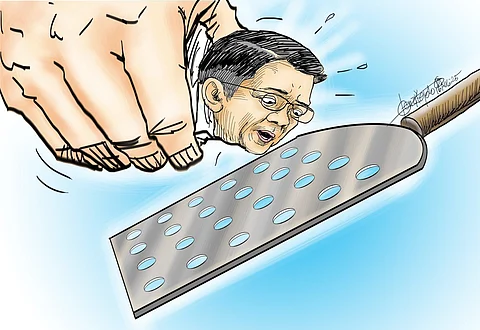
- NEWS
- the EDIT
- COMMENTARY
- BUSINESS
- LIFE
- SHOW
- ACTION
- GLOBAL GOALS
- SNAPS
- DYARYO TIRADA
- MORE

Members of Congress who admitted to having received campaign contributions from contractors of government projects may soon face serious problems.
Senator Ping Lacson said a review of the Omnibus Election Code, particularly Section 95, clearly indicates that candidates are barred from taking contributions either from a natural or a juridical person who has a contract with the government.
The penalty for the infraction is quite severe, including one to six years imprisonment without probation and perpetual disqualification from public office. Those found guilty also lose their right of suffrage.
“Those are not light consequences. So, you have to be careful because if you accept a donation and the donor has an existing contract, it can be quite difficult to explain,” warned Lacson.
On Wednesday, Senate President Chiz Escudero tried to tone down his relationship with a contractor who was among the 15 President Ferdinand Marcos Jr. named as having cornered over P100 billion in government contracts in the past three years.
Sorsogon-based Centerways Construction and Development Inc. secured between P5.16 billion and P5.4 billion in flood control projects from 2021 to 2024 when Escudero was back in the Senate.
Escudero admitted Centerways founder Lawrence Lubiano was a close friend and that Lubiano had contributed P30 million to his 2019 campaign for governor of Sorsogon.
Looking for suspicious projects has become easier after President Ferdinand Marcos Jr. launched the “Sumbong sa Pangulo” website that gives the coordinates, longitudes and latitudes of government projects. This makes it easier to pinpoint the location of projects.
Looking into the questionable flood projects, Lacson said his team discovered what he called a “reverse ghost budget.”
“A completed project is again funded in a (subsequent) budget year,” Lacson said. “That’s like a reverse ghost budget. A completed project is funded multiple times after it was already done.”
A pork barrel is also raised through the parking of allocations, Lacson continued.
For instance, a member of Congress who doesn’t represent a particular district will insert a project for a specific area in the National Expenditure Program (NEP).
The congressman who represents the district would be surprised to discover that the project he had proposed, valued at P2 billion, had suddenly been increased to P10 billion.
However, upon review, he will find that the original P2 billion fund had been reduced to between P500 million and P800 million.
The powerful legislator who inserted the project in the NEP would order the representative with the parked funds: “Implement that P10 billion.” The district congressman can do nothing but comply.
Lacson also explained the conundrum befuddling President Marcos of projects spanning cities, provinces, and regions all costing the same. Marcos had expressed surprise, saying all projects can’t cost exactly P100 million each.
“The threshold for a district engineer to conduct a bid is P150 million, so if they suddenly have P10 billion shoved into their budget, they’ll slice it up. If the project exceeds P150 million, the implementation would have to be done at the regional level,” Lacson explained. So they divide it so that each package will fit under the P150 million threshold.
Other similarly clever ways to manipulate projects with huge allocations for kickbacks and percentages are being revealed.
It has been established that the creativity of grafters knows no bounds when it comes to pilfering public funds, and it is a form of theft that happens across the board in Congress.
These geniuses should use their manipulative skills to catapult the country’s economic growth instead.
